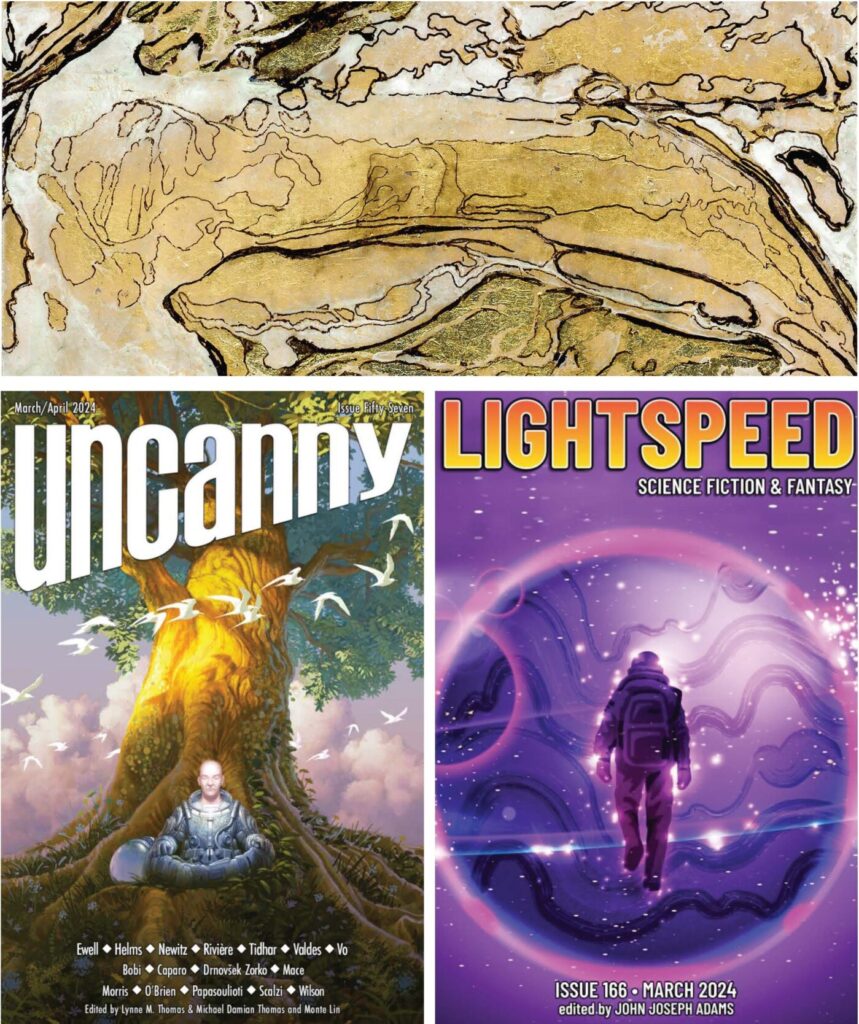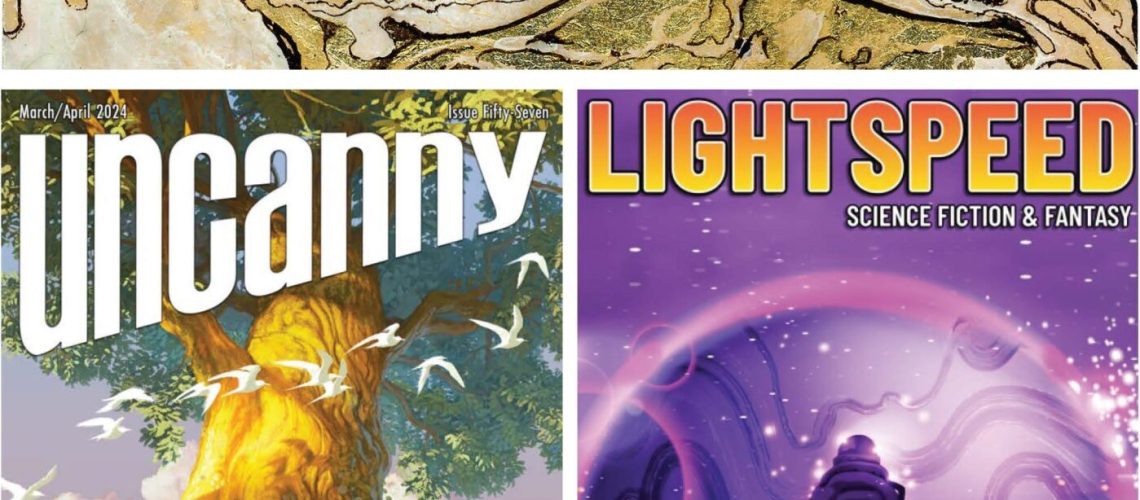My favorite short stories from March and April are all quite different from each other, which means you will probably enjoy at least one of them. “Fragments of a Symbiotic Life” by Will McMahon (published in Lightspeed Magazine Issue 166) is a humorous piece of flash fiction that’s likely to leave you with something more serious to think about after. “A Magical Correspondence, to the Tune of Heartstrings” by Valerie Valdes (published in Uncanny Magazine Issue 57) is a relatable romance about a busy woman trying to fit in just one more thing — in this case, a correspondence course in witchcraft. “Threshold” by Audrey Zhou (published in Strange Horizons) is for those of you who enjoy more unsettling reads, exploring what happens after death, or cool magic systems.

“Fragments of a Symbiotic Life” by Will McMahon
This story won over my attention and affection from its first sentence:
I was born normal enough, except that I was four days late, which isn’t so much, and slightly jaundiced, which isn’t unusual, and had a raccoon for an arm, which is admittedly strange.
This is flash fiction, recollections from the narrator who was born with a raccoon for an arm.
This story is written in a clear, accessible manner and with a certain dry humor that many readers are likely to enjoy. A raccoon for an arm is a ludicrous concept, but the narrator’s serious, reflective tone makes it feel both plausible and hilarious.
The humor is well executed and makes for a fun read, but there’s more going on here than just a playful gag. When the narrator was four years old, his parents “decided to amputate” the raccoon arm and replace it with a prosthetic. The narrator understands their decision but portrays it as just that: “their decision,” not his own. The narrator’s sadness and unease over their decision shifts the story into a more critical mode. The narrator writes that when he tells people about the raccoon, “They’re usually sympathetic. Kind. But they only see me—one broken human. Never him [the raccoon]. Never the other.” The narrator openly examines how easily we undervalue and marginalize non-human life, and it makes for a striking conclusion to the story, but there are other, less explicit, critiques that I can’t help but read into the story.
The story makes me think of people with disabilities and how they can be challenged to conform to society’s norms, rather than society adapting to welcome all people. And it makes me think of people who undergo surgeries that are not medically necessary in order to better conform to society’s norms or ideals. This includes both people who make that choice for themselves (such as with certain cosmetic surgeries) and people who have that choice made for them (such as intersex children who undergo surgery to more closely align with one gender or another). In these cases, the perceived need to conform to society’s norms and ideals can ostracize, marginalize, or harm individuals.
Yes, that’s serious and heavy, especially for a story that started with a raccoon for an arm — and that’s exactly what I love about this story: it’s a fun, wild gag, yet there’s also weighty stuff to dig into here if you are willing to sit with the story for a little bit longer.
“A Magical Correspondence, to the Tune of Heartstrings” by Valerie Valdes
Lissa is busy. Her family makes violins and harps, and they just received an unexpected order with a tight deadline. She also has her house chores, of course, and she’s on the committee organizing the Summernight dance for her village. Beyond that all — which is really more than enough — Lissa is taking a correspondence course in basic witchcraft, in which she must learn elemental cantrips, brew a potion, and create an enchantment. The course is challenging under the best of circumstances, and Lissa’s hectic schedule and chaotic, distracting family don’t help, but she is committed to persevere and see her course through to completion.
The story is set in a secondary fantasy world that reminds me of Ursula K. Le Guin’s Earthsea series, but thematically, this story feels refreshingly relatable. It’s about a busy woman trying to cram one more thing in her schedule, but this is the one rare thing that’s simply just for her and for the sake of trying something new and interesting. In Lissa’s world, witchcraft isn’t considered a practical skill, nor does she hope to turn it into a new career. It’s just something different that Lissa wanted to try out.
In our world, it is too easy to spend all your energy on work, life admin, and hobbies that are really side hustles (that is, hobbies that are themselves a form of work). It can be challenging to devote the time and energy to a hobby that’s legitimately just a hobby, something you find interesting and want to do just for the sake of it. And when you do devote yourself to such a hobby, struggle through it, and persevere, it feels great! That is what’s great about this story: watching Lissa choose to do something just for herself and persevere through the challenges. It’s relatable, inspiring, and a little cozy as well.
Speaking of cozy, there’s also a cute romance here. (Yet another thing Lissa is trying to fit in!) I was more drawn in by Lissa’s magical correspondence course, but the romance is quite enjoyable as well. If you like romance, cozy fantasy stories, or want to watch Lissa persevere through her correspondence course, I easily recommend this story.
“Threshold” by Audrey Zhou
When Li’s close friend Huyuan dies unexpectedly after her twenty-third birthday, Li has an option most of us don’t: Li can capture Huyuan’s spirit and build a new body for her to live in out of metal, wood, clay, and other materials. When Huyuan dies, it isn’t really a question for Li whether or not to do this; this is what Li does for work, and Huyuan may be the most important person to her. But even with a new body, spirits can only stay in our plane after death for so long, and does Huyuan even want to stay?
I love the magic in this story. Capturing spirits of the departed and crafting new bodies for them to inhabit is a fascinating conceit, especially for those of us who love stories that explore what happens after death. I appreciated the details put into how exactly Li crafts bodies and the different materials she uses, as well as how Li uses talismans to trap spirits, binding them to certain locations while she prepares their new bodies. It’s a thoughtful, interesting, and fun magic system. It works well in the context of this short story, but I would also love to read a longer work set in this universe.
This story is ominous and macabre, and I recommend it in particular to fans of horror. Of course building bodies for spirits of the departed is an admittedly creepy premise, but beyond that, there’s the question of what remains exactly of Huyuan’s spirit: is it most of her, or perhaps only a fragment? Until she has crafted a functional body for Huyuan, Li won’t be sure, nor can she know exactly what Huyuan wants. After Huyuan dies, Li’s mentor advises her, “Make sure you’re building a body and not a tomb.” It’s a smart but unsettling warning, one that hovers over the whole story. From the beginning of the story, it was clear to me that something was going to go wrong. I enjoyed the suspense of waiting for that to happen as well as the horror when it finally did.
What stood out to you about these stories? What were your favorite short stories from March and April?







